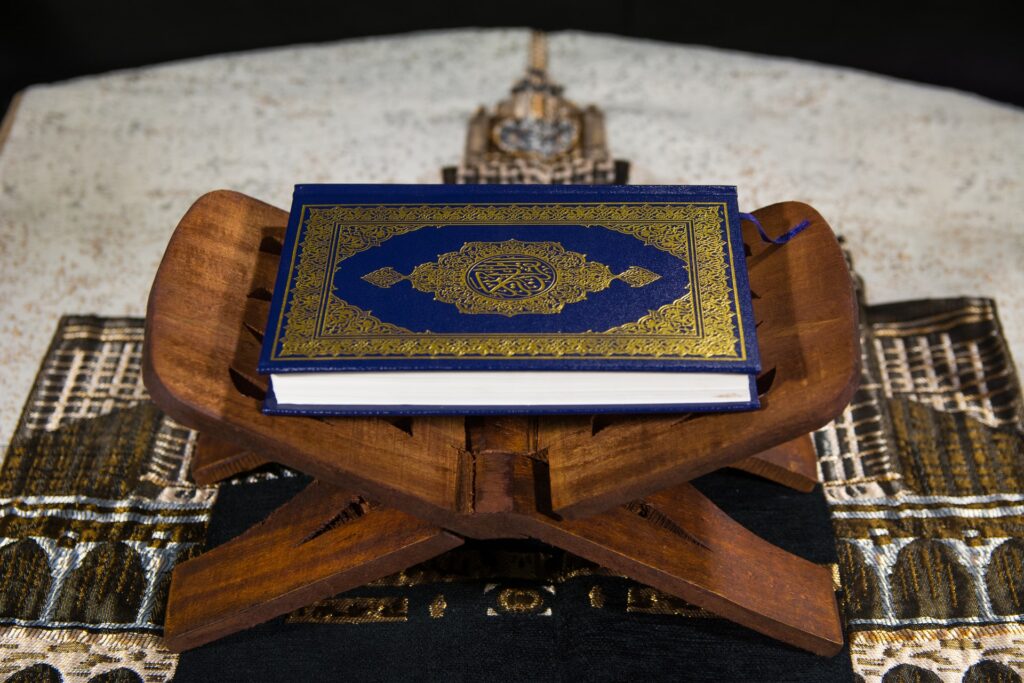Last weekend, I was so excited by the thought of praying tarawih at the mosque, but I ended up disappointed.
There, we recited the Quran as we would race the 100 meters.
People were talking in the back disturbing the others.
I’m wondering how anyone can benefit from such prayers!
If we treat the Quran this way during Ramadan, how is it the rest of the year?
The aftereffect of Ramadan—the month of the Quran—is supposed to last us a year.
Instead, we get hunger, thirst, and wasted time in meaningless prayers.
I guess this attitude is the result of turning Ramadan into more of a custom and less of an intentional act of worship.
We fast, eat till we explode, and score several prayers. Quantity over quality.
When Allah strikes an example in the Quran, it’s exactly for this type of situation.
It is meant to hit us so we can break our negative patterns.
The Quran Crushing a Mountain
“If We had sent this Quran down to a mountain, you would have seen it humbled and split apart in its awe of God—We offer people such illustrations so that they may reflect.” [Quran 59:21]
Imagine Mount Everest—earth’s highest mountain.
It’s mighty. It’s standing there. Not that much affects it.
Had this mountain had our intellect, it would have crumbled under the words of Allah.
While the Quran is powerful enough to crush the toughest of the mountains, it has little effect on people.
By striking this example, Allah is highlighting the hardness of our hearts.
We listen to the Quran, read it, or even memorize it, but nothing penetrates.
Now the question is: Why is that the case?
How Come the Quran Fails to Affect Us?

The verse alludes to the answer: We Don’t Reflect!
There are not a thousand ways to connect with Allah.
You can reach Him through His creation, actions, or words.
None of these ways can be taken mindlessly.
The universe requires contemplation. His actions on individuals and nations demand serious thinking. The revelation needs deep reflection.
Probably, the most accessible of all is the last option—to reflect upon the Quran.
Reflecting is an individual initiative that requires serious and continuous thinking.
Without it, the Quran doesn’t reach its purpose.
As Muhammad Iqbal said:
“If [man] does not take the initiative, if he does not evolve the inner richness of his being…then the spirit within him hardens into a stone and he is reduced to the level of dead matter.”
Hard As Rocks

We are not the first ones to experience the hardness of hearts.
The Israelites had something similar.
Despite witnessing so many signs, their hearts didn’t melt:
“Even after that, your hearts became as hard as rocks, or even harder, for there are rocks from which streams spring out, and some from which water comes when they split open, and others which fall down in awe of God: He is not unaware of what you do.” [Quran 2:74]
This is a parable of three kinds of heart. Water represents faith (iman).
Some hearts require so little to bring the faith that’s already inside them.
Other hearts need a shock to do so.
In explaining this verse, Nouman Ali Khan gave the example of Abu Bakr for the first category and Umar for the second.
Just like in the parable of light, the connection happens when the light of the heart meets the light of revelation.
This meeting doesn’t occur for the third category of hearts:
The desert Arabs say, ‘We have faith.’ [Prophet], tell them, “You do not have faith. What you should say instead is, “We have submitted,” for faith has not yet entered your hearts.’ [Quran 49:14]
Jafar Ibn Abi Talib’s Speech in the Court of Negus

Most of you are familiar with the story of this speech.
Many highlights the eloquence of Jaffar. But what I want you to pay attention to is how much the Quran changed people.
This speech was given only five years after the beginning of the revelation.
It’s an important point to keep in mind.
Salat as we know it was prescribed five years later. The prohibition of alcohol came eleven years after this speech.
Yet, despite they were exposed to a small portion of the Quran and only for five years, they experienced a complete transformation.
So check what he said:
“O King, we were a people in a state of ignorance and immorality, worshipping idols and eating the flesh of dead animals, committing all sorts of abomination and shameful deeds, breaking the ties of kinship, treating guests badly, and the strong among us exploited the weak.
We remained in this state until God sent us a Prophet, one of our own people whose lineage, truthfulness, trustworthiness, and integrity were well-known to us. He called us to worship God alone and to renounce the stones and the idols which we and our ancestors used to worship besides God.
He commanded us to speak the truth, to honor our promises, to be kind to our relations, to be helpful to our neighbors; to cease all forbidden acts, to abstain from bloodshed, to avoid obscenities and false witnesses; to not appropriate an orphan’s property nor slander chaste women.
He ordered us to worship God alone and not to associate anything with Him, to uphold prayer, to give charity, and to fast in the month of Ramadan…”
The Purpose of the Quran
How many of us have been exposed to the Quran for five years? Or even decades?
Yet, years pass by and nothing happens. No internal change; no external change.
The Quran is reduced to a list of dos and don’ts disconnected from the Source.
It’s normal then we don’t get the same blessings as the first generations.
If you look at the first ten years of the revelation, mostly it was about knowing God.
Today, knowing Allah is not a priority.
The result is what He warned us from:
“Do not be like those who forget God, so God causes them to forget their own soul.” [Quran 59:19]
The Quran came to awaken our higher consciousness to enable the connection to Allah.
We get to know better our true selves, which makes the connection easier.
Final Thoughts

This Quran doesn’t enter a heart without turning its priorities upside down.
We are good at building mosques but not so good at producing people of understanding and comprehension.
We need a slogan reaching every Muslim and saying: Just Pause and Think!
“Is it not time for the believers to humble their hearts to the remembrance of God and the Truth that has been revealed, and not to be like those who received the Scripture before—those who were spoiled for so long that their hearts became hardened. And many of them are still rebellious.” [Quran 57:16]
Article published: April 10, 2022
Popular Articles
- 7 Lessons from Luqman that Will Make You Wise
- How to Enjoy Salat and Make it Meaningful
- Mongols Invasions: Some Forgotten Lessons to Today’s Muslims
- For or Against Vaccines? That’s Not Really the Question
- Are Muslims Meant to Be Sleep Deprived?
- Islamic Psychology: A Model Where Faith Has Its Place
- Muslims Judging Each Other: Why and How to Be Less Judgy
- The Value of Time
- 3 Tips to Unlock the Believer Mindset
- The Certainties of Muslims in Uncertain World
- Allah According to Allah: The Beauty Behind the Verse of Light
- How to Make People Change their Mind: Persuasion!
- 5 Powerful Duas from the Quran to Help You in Both Worlds

